An Introduction to Western Philosophy 1
- 格式:pptx
- 大小:4.15 MB
- 文档页数:35
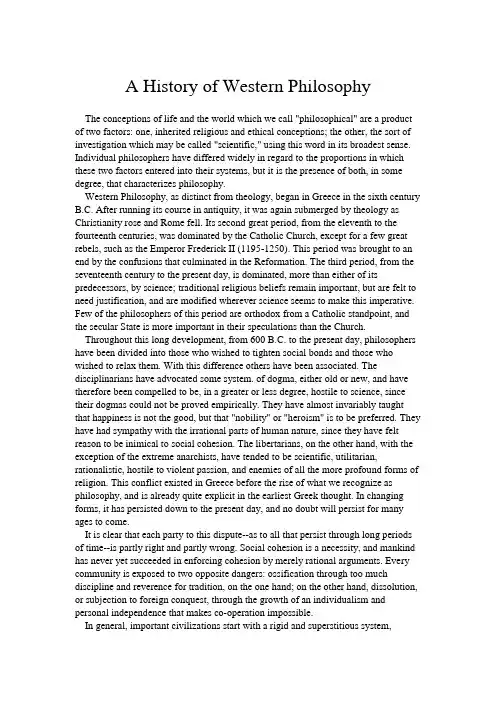
A History of Western PhilosophyThe conceptions of life and the world which we call "philosophical" are a product of two factors: one, inherited religious and ethical conceptions; the other, the sort of investigation which may be called "scientific," using this word in its broadest sense. Individual philosophers have differed widely in regard to the proportions in which these two factors entered into their systems, but it is the presence of both, in some degree, that characterizes philosophy.Western Philosophy, as distinct from theology, began in Greece in the sixth century B.C. After running its course in antiquity, it was again submerged by theology as Christianity rose and Rome fell. Its second great period, from the eleventh to the fourteenth centuries, was dominated by the Catholic Church, except for a few great rebels, such as the Emperor Frederick II (1195-1250). This period was brought to an end by the confusions that culminated in the Reformation. The third period, from the seventeenth century to the present day, is dominated, more than either of its predecessors, by science; traditional religious beliefs remain important, but are felt to need justification, and are modified wherever science seems to make this imperative. Few of the philosophers of this period are orthodox from a Catholic standpoint, and the secular State is more important in their speculations than the Church. Throughout this long development, from 600 B.C. to the present day, philosophers have been divided into those who wished to tighten social bonds and those who wished to relax them. With this difference others have been associated. The disciplinarians have advocated some system. of dogma, either old or new, and have therefore been compelled to be, in a greater or less degree, hostile to science, since their dogmas could not be proved empirically. They have almost invariably taught that happiness is not the good, but that "nobility" or "heroism" is to be preferred. They have had sympathy with the irrational parts of human nature, since they have felt reason to be inimical to social cohesion. The libertarians, on the other hand, with the exception of the extreme anarchists, have tended to be scientific, utilitarian, rationalistic, hostile to violent passion, and enemies of all the more profound forms of religion. This conflict existed in Greece before the rise of what we recognize as philosophy, and is already quite explicit in the earliest Greek thought. In changing forms, it has persisted down to the present day, and no doubt will persist for many ages to come.It is clear that each party to this dispute--as to all that persist through long periods of time--is partly right and partly wrong. Social cohesion is a necessity, and mankind has never yet succeeded in enforcing cohesion by merely rational arguments. Every community is exposed to two opposite dangers: ossification through too much discipline and reverence for tradition, on the one hand; on the other hand, dissolution, or subjection to foreign conquest, through the growth of an individualism and personal independence that makes co-operation impossible.In general, important civilizations start with a rigid and superstitious system,gradually relaxed, and leading, at a certain stage, to a period of brilliant genius, while the good of the old tradition remains and the evil inherent in its dissolution has not yet developed. But as the evil unfolds, it leads to anarchy, thence, inevitably, to a new tyranny, producing a new synthesis secured by a new system of dogma. The doctrine of liberalism is an attempt to escape from this endless oscillation. The essence of liberalism is an attempt to secure a social order not based on irrational dogma, and insuring stability without involving more restraints than are necessary for the preservation of the community. Whether this attempt can succeed or not is only determine by the future..。

《西方哲学史》课程教学大纲一、《西方哲学史》课程说明(一)课程代码:03120012(二)课程英文名称:The history of Western philosophy(三)开课对象:(四)课程性质:本课程属于大学文理基础课人文类或文史政等专业的专业教育课。
本课程的目的在于通过西方哲学发展历史的介绍,展示西方重要思想家的重要哲学思想,揭示西方哲学发展的逻辑和一般规律。
(五)教学目的:通过西方哲学史的教学,使学生了解西方哲学发生和发展的基本情况和大致线索,理解重要哲学家的重要哲学思想,拓宽理论视野,增强思辨能力,提高理论水平。
(六)教学内容:本课程包括了古希腊哲学、基督教哲学、近代英国和欧洲大陆各国哲学的教学。
讲授中,应当侧重于西方哲学发展的内在逻辑的揭示。
注重启发和哲学理论深度的挖掘。
课前及课后,应当及时布置有关哲学原著的阅读。
(七)学时数、学分数及学时数具体分配学时数:36学时学分数:2学分学时具体分配:(八)教学方式借助现代教育技术,结合课外阅读和课堂讨论,以课堂教学为主要教学方式。
(九)考核方式和成绩记载说明考核方式为考试。
综合成绩根据平时成绩和期末考试成绩评定。
其中,平时成绩占40%(书面作业、原著阅读情况检查和上课出勤情况的检查各占一半平时成绩),期末考试成绩占60%。
二、讲授大纲与各章的基本要求第一章古希腊罗马哲学教学要点:通过本章的教学使学生了解西方哲学的起源,理解古希腊罗马时期重要哲学家的主要哲学著作和重要哲学思想。
1、使学生了解古代希腊和罗马社会和哲学起源发展的关系。
2、使学生掌握古代哲学本体论的基本内涵。
3、了解古代西方各主要哲学流派和主要哲学家的基本思想。
4、准确理解古代哲学的基本概念和基本范畴。
教学时数:10学时教学内容:第一节早期希腊哲学一、伊奥尼亚学派二、南意大利学派第二节中期希腊哲学一、智者和原子论先驱二、原子论三、理念论的起源和发展四、亚里士多德的哲学及对哲学历史的批判总结第三节晚期希腊哲学一、晚期苏格拉底学派二、晚期原子论和伊壁鸠鲁哲学第四节古代罗马哲学考核要求:1、基本概念1.1 本原或“始基”1.2 原子1.3 理念1.4 数与和谐1.5 “四因”1.6 “存在”与“非存在”1.7 “四根”1.8 “形而上学”2、基本命题或基本思想2.1 “水是万物的始基”2.2 “一切皆流,无物常住”2.3 “美在和谐”2.4 “飞矢不动”2.5 “认识你自己”2.6 “学习就是回忆”2.7 “实体是不表述主体并存在于主体之外的”2.8 “美德即是中道”2.9 “幸福是肉体的无痛苦和精神的无纷扰”3、综合理解3.1 哲学本体论的起源,自然哲学的历史价值3.2 原子论与理念论的对立及其实质3.3 先验论哲学对教育学的影响3.4 亚里士多德对哲学史的批判和总结3.5 “原子论”的起源和发展3.6 “伊壁鸠鲁主义”对伦理学的贡献及其历史局限性第二章基督教哲学和文艺复兴时期哲学教学要点:通过本章的学习,使学生了解基督教和基督教哲学的发生和发展的大致线索,理解经院哲学及其基本特征,理解唯名论和唯实论的争论实质,理解文艺复兴运动人本主义的基本思想及其实质。
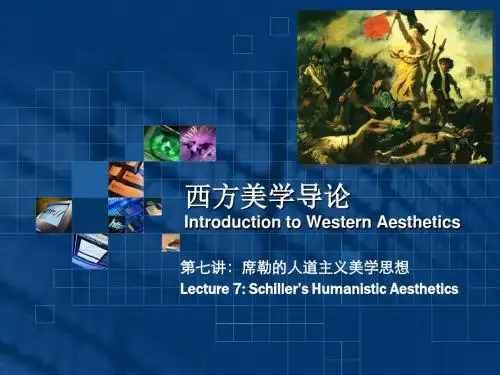
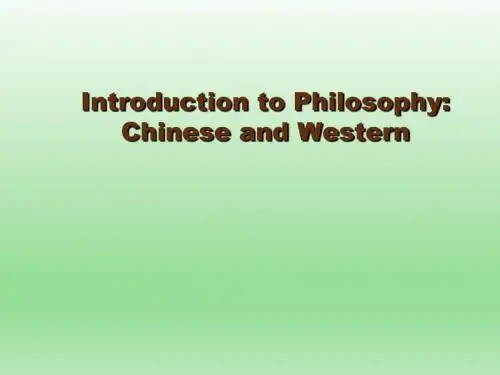
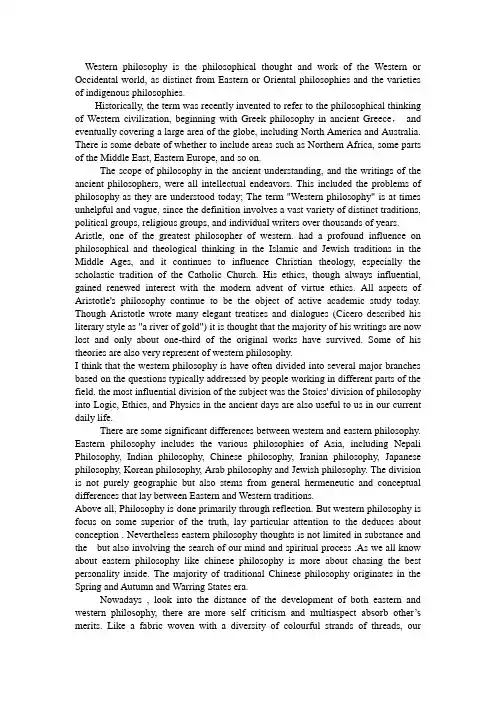
Western philosophy is the philosophical thought and work of the Western or Occidental world, as distinct from Eastern or Oriental philosophies and the varieties of indigenous philosophies.Historically, the term was recently invented to refer to the philosophical thinking of Western civilization, beginning with Greek philosophy in ancient Greece,and eventually covering a large area of the globe, including North America and Australia. There is some debate of whether to include areas such as Northern Africa, some parts of the Middle East, Eastern Europe, and so on.The scope of philosophy in the ancient understanding, and the writings of the ancient philosophers, were all intellectual endeavors. This included the problems of philosophy as they are understood today; The term "Western philosophy" is at times unhelpful and vague, since the definition involves a vast variety of distinct traditions, political groups, religious groups, and individual writers over thousands of years. Aristle, one of the greatest philosopher of western. had a profound influence on philosophical and theological thinking in the Islamic and Jewish traditions in the Middle Ages, and it continues to influence Christian theology, especially the scholastic tradition of the Catholic Church. His ethics, though always influential, gained renewed interest with the modern advent of virtue ethics. All aspects of Aristotle's philosophy continue to be the object of active academic study today. Though Aristotle wrote many elegant treatises and dialogues (Cicero described his literary style as "a river of gold") it is thought that the majority of his writings are now lost and only about one-third of the original works have survived. Some of his theories are also very represent of western philosophy.I think that the western philosophy is have often divided into several major branches based on the questions typically addressed by people working in different parts of the field. the most influential division of the subject was the Stoics' division of philosophy into Logic, Ethics, and Physics in the ancient days are also useful to us in our current daily life.There are some significant differences between western and eastern philosophy. Eastern philosophy includes the various philosophies of Asia, including Nepali Philosophy, Indian philosophy, Chinese philosophy, Iranian philosophy, Japanese philosophy, Korean philosophy, Arab philosophy and Jewish philosophy. The division is not purely geographic but also stems from general hermeneutic and conceptual differences that lay between Eastern and Western traditions.Above all, Philosophy is done primarily through reflection. But western philosophy is focus on some superior of the truth, lay particular attention to the deduces about conception . Nevertheless eastern philosophy thoughts is not limited in substance and the but also involving the search of our mind and spiritual process .As we all know about eastern philosophy like chinese philosophy is more about chasing the best personality inside. The majority of traditional Chinese philosophy originates in the Spring and Autumn and Warring States era.Nowadays , look into the distance of the development of both eastern and western philosophy, there are more self criticism and multiaspect absorb other’s merits. Like a fabric woven with a diversity of colourful strands of threads, oursociety contains rich philosophy cultural heritage which hails from eastern and western world.We live in a community where different cultures interact, we absorb and learn from one another's fine traditions.。
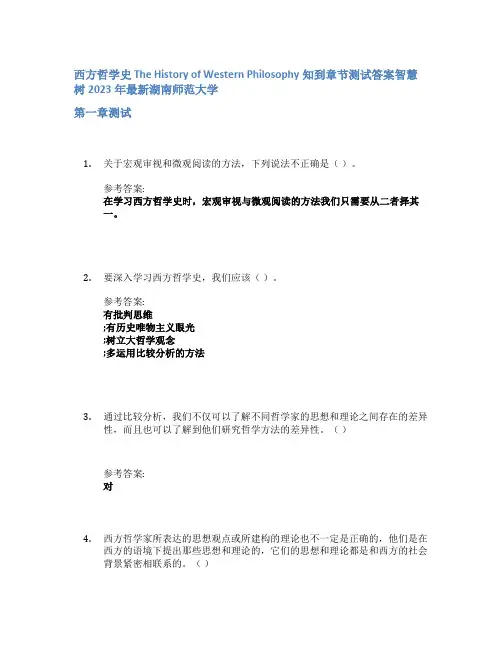
西方哲学史 The History of Western Philosophy知到章节测试答案智慧树2023年最新湖南师范大学第一章测试1.关于宏观审视和微观阅读的方法,下列说法不正确是()。
参考答案:在学习西方哲学史时,宏观审视与微观阅读的方法我们只需要从二者择其一。
2.要深入学习西方哲学史,我们应该()。
参考答案:有批判思维;有历史唯物主义眼光;树立大哲学观念;多运用比较分析的方法3.通过比较分析,我们不仅可以了解不同哲学家的思想和理论之间存在的差异性,而且也可以了解到他们研究哲学方法的差异性。
()参考答案:对4.西方哲学家所表达的思想观点或所建构的理论也不一定是正确的,他们是在西方的语境下提出那些思想和理论的,它们的思想和理论都是和西方的社会背景紧密相联系的。
()参考答案:对5.之所以要学习西方哲学史,是因为()。
参考答案:学习西方哲学史是了解西方文化精髓的必由之路;学习西方哲学史是学习西方哲学的重要基础;学习西方哲学史是培养哲学思维的重要途径第二章测试1.宇宙是无限的。
()参考答案:对2.充满和空虚都是存在者。
()参考答案:错3.阿那克西曼德是西方哲学史上最先使用“本原”概念的哲学家。
()参考答案:对4.毕达哥拉斯认为音乐具有安抚心灵和净化灵魂的效果,音乐体现的是哲人的德性。
()参考答案:错5.宇宙是由充满和空虚构成的。
()参考答案:对第三章测试1.对于萨特而言,自在的存在意味着为对象赋予意义。
()参考答案:错2.大陆理性主义和英国经验主义的共同目标是论证上帝的存在。
()参考答案:错3.按照观念的来源,洛克将观念划分为一般观念与特殊观念。
()参考答案:错4.英国经验主义者中摧毁了物质实体,却保留了精神实体和上帝存在的是培根。
()参考答案:错5.休谟的怀疑论主要针对日常生活的常识。
()参考答案:错第四章测试1.研究古希腊的悲剧和艺术,宣扬权力意志学说是尼采晚期(1883-1889年)思想的主题。
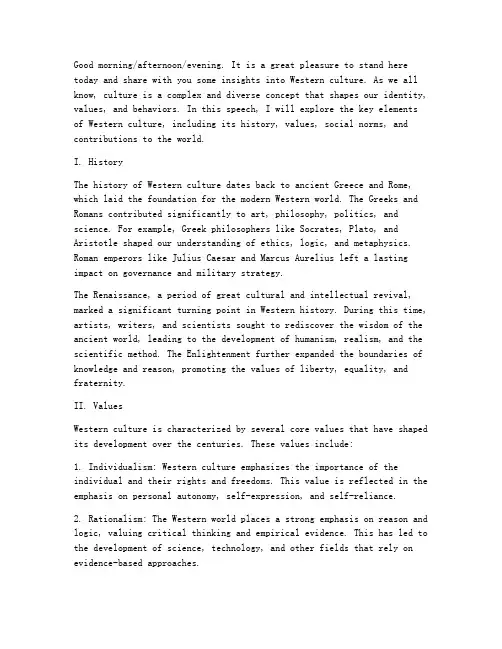
Good morning/afternoon/evening. It is a great pleasure to stand here today and share with you some insights into Western culture. As we all know, culture is a complex and diverse concept that shapes our identity, values, and behaviors. In this speech, I will explore the key elements of Western culture, including its history, values, social norms, and contributions to the world.I. HistoryThe history of Western culture dates back to ancient Greece and Rome, which laid the foundation for the modern Western world. The Greeks and Romans contributed significantly to art, philosophy, politics, and science. For example, Greek philosophers like Socrates, Plato, and Aristotle shaped our understanding of ethics, logic, and metaphysics. Roman emperors like Julius Caesar and Marcus Aurelius left a lasting impact on governance and military strategy.The Renaissance, a period of great cultural and intellectual revival, marked a significant turning point in Western history. During this time, artists, writers, and scientists sought to rediscover the wisdom of the ancient world, leading to the development of humanism, realism, and the scientific method. The Enlightenment further expanded the boundaries of knowledge and reason, promoting the values of liberty, equality, and fraternity.II. ValuesWestern culture is characterized by several core values that have shaped its development over the centuries. These values include:1. Individualism: Western culture emphasizes the importance of the individual and their rights and freedoms. This value is reflected in the emphasis on personal autonomy, self-expression, and self-reliance.2. Rationalism: The Western world places a strong emphasis on reason and logic, valuing critical thinking and empirical evidence. This has led to the development of science, technology, and other fields that rely on evidence-based approaches.3. Humanism: Humanism is the belief in the inherent dignity and worth of every human being. This value promotes compassion, empathy, and the pursuit of knowledge and understanding.4. Pluralism: Western culture is characterized by its diversity and tolerance of different beliefs and opinions. This pluralistic approach fosters a sense of community and cooperation among its citizens.III. Social NormsSocial norms are the unwritten rules that govern behavior within a society. In Western culture, some of the key social norms include:1. Equality: Western societies strive for equality of opportunity and treatment, promoting social justice and the elimination ofdiscrimination based on race, gender, religion, or other characteristics.2. Personal Responsibility: Westerners are encouraged to take responsibility for their actions and to make decisions based on their own values and beliefs.3. Freedom of Expression: Western societies value the freedom to express oneself, whether through art, speech, or other forms of expression. This freedom is protected by laws that guarantee freedom of speech and the press.4. Tolerance: Western culture emphasizes the importance of tolerance and respect for others, even when their beliefs or opinions differ from our own.IV. Contributions to the WorldWestern culture has made significant contributions to the world in various fields:1. Science and Technology: Western societies have been at the forefront of scientific and technological advancements, leading to innovationsthat have improved the quality of life for billions of people worldwide.2. Art and Literature: Western art and literature have influenced the world in profound ways, inspiring countless artists and writers to explore the human experience and express their creativity.3. Philosophy and Ethics: Western philosophy has provided a frameworkfor understanding moral principles and ethical dilemmas, influencing the development of laws and policies worldwide.4. Political Systems: Western political systems, such as democracy and capitalism, have spread to other parts of the world, shaping thepolitical landscapes of numerous countries.In conclusion, Western culture is a rich tapestry of history, values, and contributions that have shaped the modern world. Its emphasis on individualism, rationalism, humanism, and pluralism has led to the development of a diverse and dynamic society that continues to influence the world in numerous ways. As we navigate the complexities of the 21st century, it is important to recognize and appreciate the uniquequalities of Western culture and to learn from its strengths and challenges.Thank you for your attention.。
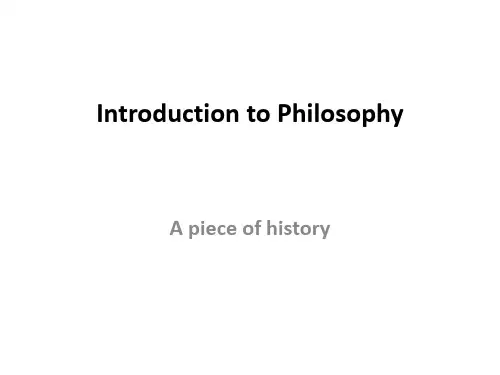
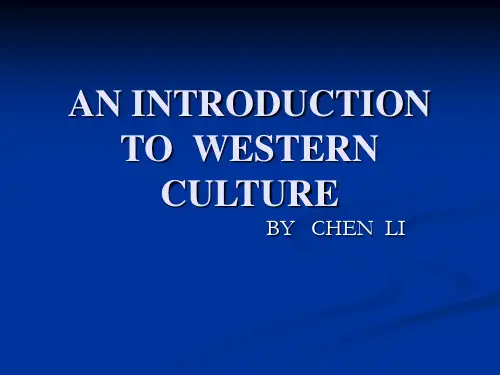
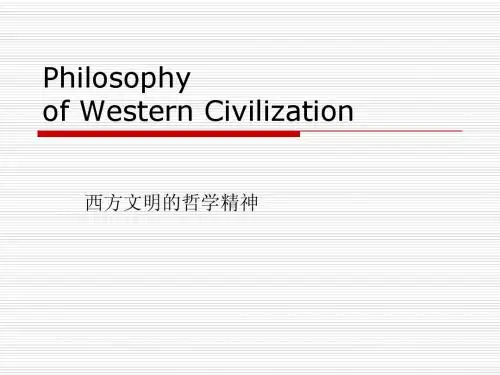

高二英语哲学思考阅读理解20题1<背景文章>Plato is one of the most famous philosophers in history. His philosophical ideas have had a profound impact on Western thought. One of his most important concepts is the Theory of Forms. According to Plato, the physical world that we perceive with our senses is only a reflection of the true reality, which consists of eternal and unchanging Forms.For example, when we look at a beautiful flower, what we see is not the true essence of beauty. The true beauty lies in the Form of Beauty, which is an abstract and perfect concept that exists independently of any particular flower. Only by understanding the Form of Beauty can we truly appreciate the beauty of all things.Another famous idea of Plato is the Allegory of the Cave. In this allegory, people are depicted as being trapped in a cave, only able to see shadows on the wall. They mistake these shadows for reality, not realizing that there is a whole world outside the cave. The philosopher, on the other hand, is like someone who has escaped from the cave and seen the true light of reality.Plato believed that education is the process of leading people out of the cave and helping them to understand the true nature of reality. Throughphilosophical inquiry and reflection, people can gradually ascend from the world of appearances to the world of Forms.Plato's philosophy also emphasizes the importance of reason and intellectual pursuit. He believed that only through the use of reason can we gain true knowledge and understanding. Emotions and desires should be controlled by reason, as they can often lead us astray.In conclusion, Plato's philosophy offers a rich and complex view of reality. His ideas continue to inspire and challenge thinkers to this day.1. According to Plato, the physical world is ______ the true reality.A. the same asB. a reflection ofC. independent ofD. opposite to答案:B。